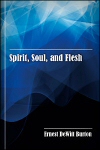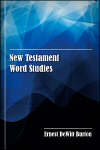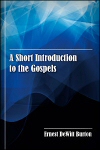Ernest DeWitt Burton New Testament Studies Collection (3 vols.)
Digital Logos Edition
Overview
This collection by Ernest Dewitt Burton—professor, theologian, lexicographer, and scholar—brings forth his consequential and influential exegesis of the New Testament in three accessible volumes. The first two volumes of this collection contain Burton’s extensive linguistic research of the New Testament, with detailed and fascinating interpretations of various words and terms used in the New Testament, along with translations from their original Greek, Hebrew, and Latin into English. The third volume of this collection is Burton’s captivating exploration of the origins of the four Gospels.
For almost a century, Burton’s work in New Testament studies, Greek linguistics, Christian history, and source criticism has been lauded for its authority and influence. Head of New Testament Literature and Interpretation at the University of Chicago, Burton’s substantial contribution to Christian thought and biblical exegesis has been astounding.
With Burton’s customary rich prose and expansive research, these books are perceptive and exceptional in their scholarship. Perfect for students, theologians, scholars, and historians, this 3-volume set is integral to early New Testament studies.

Key Features
- Detailed table of contents
- Thorough appendices
- Comprehensive introductions by the author
Praise for the Print Edition
This is strong meat, but the honest Bible scholar is apt to be a bit radical, for the Bible, and especially the New Testament, is a radical and revolutionary book.
—The Sewanee Review
Certainly the careful student of the Gospels will find nothing in recent synoptic literature more necessary in making a thoroughly scientific study of the Gospels.
—Bibliotheca Sacra, Vol. 75
Product Details
- Title: Ernest DeWitt Burton New Testament Studies Collection (3 vols.)
- Publisher: University of Chicago Press
- Author: Ernest DeWitt Burton
- Volumes: 3
- Pages: 489
Individual Titles

With the purpose of laying the lexicographical foundation for the interpretation of the words “spirit,” “soul,” and “flesh” in the New Testament, Ernest DeWitt Burton explores the ancient Greek and Hebrew writer’s use of these words in the Old Testament and in Greek literature from the earliest period to 180 A.D. An extensive and methodical study, Burton’s important work is also practical: Greek, Hebrew, and Latin passages are given in the original and in translation.
Chapters include:
- Spirit, Soul, and Flesh in Greek Writers from Homer to Aristotle
- Spirit, Soul, and Flesh in the Old Testament
- Spirit, Soul, and Flesh in Greek Writers from Epicurus to Arius Didymus
- Spirit, Soul, and Flesh in Greek Writers of the Early Christian Period
- Spirit, Soul, and Flesh in Jewish-Greek Literature
- Spirit, Soul, and Flesh in Ethnic Religious Writings Approximately Contemporary with the New Testament
- Spirit, Soul, and Flesh in the New Testament

Published posthumously, New Testament Word Studies is an excerpt from Ernest DeWitt Burton’s unfinished, life-long project to create a dictionary of terms for the English New Testament. This volume is comprised of Burton’s in-depth analysis of some of the most significant words from the New Testament. Burton explores a word’s treatment in the New Testament, as well as its usage in other writings from the same era. A succinct and practical reference book on the New Testament, Burton also provides a detailed index categorized by the books of the New Testament and the verses/passages he covers for convenient accessibility.
Chapters include:
- Sin
- Repentance
- Forgiveness
- Law
- Faith
- Righteousness and Justification
- God as Father
- Titles and Predicates of Jesus
- Spirit
- Soul
- Flesh
- Apostle
- Grace
- Peace
- World, Age, Forever
- Reveal and Manifest

In five captivating segments, Ernest DeWitt Burton provides an astute analysis of the Gospels using source criticism. Dedicating a chapter to each Gospel, Burton’s analysis divides each Gospel into four categories: “The Author of the Gospel,” “The Readers of the Gospel,” “The Purpose of the Gospel,” and “The Plan of the Gospel.” With perceptive observations and Burton’s characteristic attention to language and its meaning, A Short Introduction to the Gospels is essential to fully understanding the origin, genuineness, and inter-relationships of the Gospels.
About Ernest DeWitt Burton
Ernest DeWitt Burton (1856–1925) graduated from Denison University in 1876, then from Rochester Theological Seminary in 1882. His studies also carried him to Germany at Leipzig and Berlin. Burton taught at the seminaries in Rochester and Newton before becoming head of the department of New Testament Literature and Interpretation at the University of Chicago—where he was president from 1923–1925.